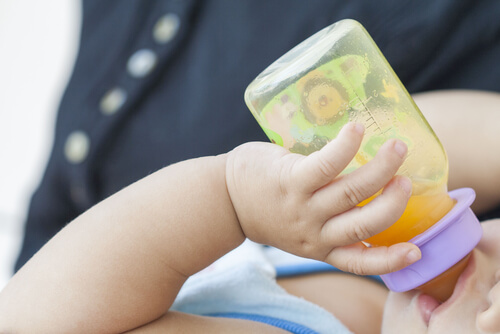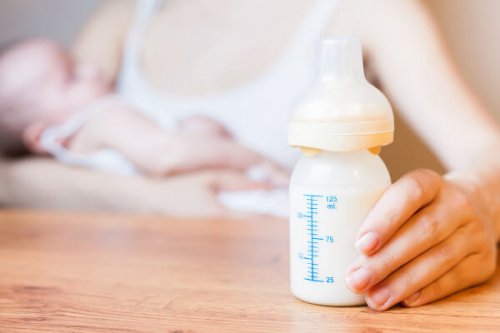The Importance of Iron in a Baby's Diet

Iron in a baby’s diet is very important, mainly because it can prevent diseases such as anemia, one of the most frequent problems during the growth phase.
This mineral cannot be lacking in a baby’s diet, especially when they are between 0 and 12 months old.
According to the U.S. Institute of Medicine, it is advisable for children between the ages of 6 months to 1 year to receive 11 mg of iron each day. For children 12 to 36 months old, 7 mg per day is recommended.
To start adding iron to a baby’s diet, some foods work better than others:
Iron-rich foods
From the moment a baby starts supplementary feeding, their diet much be rich in iron. Therefore, it’s important to add foods that contain this mineral to their diet.
Here are some recommendations:
- It is advisable to avoid milk with low iron content, such as cow’s milk, goat’s milk or soy milk.
- It is advisable to reduce the consumption of foods that contain iron absorption inhibitors or anti-nutrients, such as fiber, calcium, oxalates, phytates and phosphates.
- It is important to introduce food such as meat and fish in the form of a puree starting at 6 months of age.
- The baby should consume foods that contain Vitamin C, which helps with iron absorption.

- The daily intake of milk should be 500 ml per day.
- It is good for the baby to eat vegetable purees, such as peas, spinach, broccoli, cauliflower and beetroot.
Iron is a mineral that is abundant in beef, poultry and fish.
Consequences of a lack of iron in a baby’s diet
A lack of iron in a baby’s diet can have many consequences, anemia being the most common. But in addition to this disease, the child may suffer from other health problems, such as:
- Latent iron deficiency: lack of iron deposits in the body
- Iron-deficiency anemia: can cause hematopoiesis
- Ferropenia: lack of plasma or circulating iron levels
- Damage to the central nervous system during the development of the cognitive and psychomotor system
- It also affects memory and learning functions.
Each red blood cell contains iron in its hemoglobin, which is the pigment that carries oxygen to the tissues of the lungs.
How to guarantee iron consumption
Incorporating iron into a baby’s diet to avoid iron deficiency should begin at 4 or 6 months of age by introducing foods that are rich in this mineral and that favor its absorption.
The World Health Organization (WHO) recommends guaranteeing the consumption of iron in a child’s diet via fortified foods, supplementation and diversification.
The absorption of iron is more effective when it is ingested with ascorbic acid or citric acid occurs.
Vitamin C, found in oranges and other fruits, improves the absorption of this mineral in a baby’s diet. Some experts say that certain infusions and cow’s milk can inhibit the absorption of iron.
Breast milk is an excellent way to provide this mineral to your baby. After breastfeeding, a continuation formula can help provide the extra iron your child needs.
Remember that a fortified continuation formula can help supplement a balanced diet.

Don’t forget to take iron during pregnancy
Consuming iron during pregnancy is also essential. Your body will need this mineral to keep your immune system healthy and for additional reasons outlined below:
- The amount of blood circulating in your body increases during pregnancy, so you’ll need iron to make more hemoglobin.
- You need more iron to nourish the growth of the placenta.
- Iron deficiency anemia is related to premature birth and low birth weight.
We must be very aware that our babies are receiving the proper amount of iron for growth and development.
Food is very important and the lack of any fundamental mineral can cause health problems.
In case you have any concerns about your baby’s diet and nutrition, it is essential that you consult with your pediatrician.
All cited sources were thoroughly reviewed by our team to ensure their quality, reliability, currency, and validity. The bibliography of this article was considered reliable and of academic or scientific accuracy.
- He H., Qiao Y., Zhang Z., Wu Z., et al., Dual action of vitamin C in iron supplement therapeutics for iron deficiency anemia: prevention of liver damage induced by iron overload. Food Funct, 2018. 9 (10): 5390-5401.
- Cusick SE., Georgieff MK., Rao R., Approaches for reducing the risk of early life iron deficiency induced brain dysfunction in children. Nutrients, 2018.